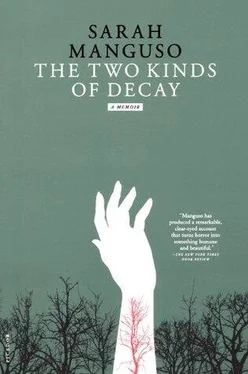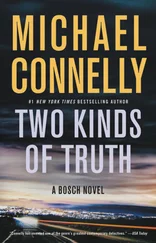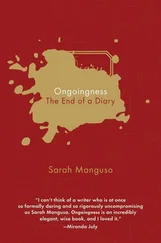Then he asked me about the scabs on my chest from where the line had just been pulled out of me, and listened to the things I told him, and held me very tightly.
Two mornings later, when we were in the courtyard again, seated in rows, about to receive our diplomas, he was wearing a buttoned shirt and sweating, because his neck was covered with bright red marks.
Almost seven years passed. Victor and I wrote every day. I lived in New York and he lived in Chicago.
He told me some of his secrets, and I told him some of mine.
Our letters were intimate, but I didn’t get around to explaining to him that I’d recovered from my disease only because he had selflessly had intercourse with an ugly version of a girl he’d once had a crush on.
A little less than seven years after I was cured of my disease through the mystical power of intercourse, Victor had an aneurysm and died.
I remember three things about the gamma globulin infusions.
The first is that when I was in Emergency for the fourth or fifth time, and my breathing had become shallow enough for Triage Level 1, and I needed another central line implanted right then, I begged for gamma instead of apheresis.
But my blood was already too poisonous to leave as it was, and the doctors said they had to replace my plasma in order to remove the antibodies that were there already, or I might stop breathing.
So even though I was sobbing and begging not to be implanted with another line, I knew it would be implanted. I was too agitated to have the surgery right at that moment, so it was decided I’d be given a half milligram of lorazepam, which is what I was given when I had a panic attack.
Because of an administrative error, I was given four times the amount of lorazepam I was usually given. And I knew it. They gave me four pills instead of the usual one, and I didn’t say anything. I was hoping I would pass out, but I didn’t. Not quite. I was sedated just enough. The regular dose wouldn’t have worked.
The second thing I remember about gamma is that during a later hospitalization, I was hooked up to a small pump, much smaller than the almost car-sized machine used for plasma exchange. At last we would see whether gamma would work.
It didn’t do a thing except slur my speech for a few hours. And so for months afterward I continued with my tedious rounds of plasma replacement to clean up the poison that I still, despite the gamma infusion, continued to secrete into my blood.
And the third thing is that in March 1996, I had another infusion, of a much higher concentration than the first two, and received the infusion while lying in a meditative state in the Outpatient Oncology ward, and felt fine, maybe a little tired, and was driven home, and by the time I got into bed my head hurt so much I vomited. And I was sick for the next couple of days, too sick to think about the gamma.
But after that week was over, the tingling and numbness in my limbs wasn’t any worse than it had been before the infusion, because the gamma had worked. Sort of. It didn’t cure me, but I didn’t relapse for four months.
The way I see it, gamma gave me three months, and Victor gave me one more after that and then some.
I didn’t tell my doctors about Victor.
After my third gamma infusion, my mother and I drove to the town dump on a weekday. Our town dump was not so much a dump as a futuristic recycling station with three kinds of glass, six kinds of plastic, two kinds of paper, compost and mulch and firewood, a book swap, and a section labeled Recycle, which was where you could get a pretty good pair of skis and where my parents got most of the furniture on the first floor of our house, including an antique Shaker chair.
My mother and I brought three of my canes there, and two walkers, including the one with the racing stripes.
And that day we ran into a neighbor, which was not uncommon. People went to the dump weekly, at least, to take a treasure hunt through Recycle. There were stage lights there that day, and I wanted to bring them home. Maybe because they were the heaviest things I saw there, and I wanted to see if I could lift them.
Our neighbor told us her mother had died just that week and that she was at the dump with some of the things from her mother’s apartment. Alzheimer’s, she whispered.
And my mother told our neighbor we were sorry, and that her mother, my grandmother, had had Alzheimer’s, too.
Then the neighbor saw the pile of canes and walkers we’d just left on the ground, and looked at my mother, and indicated she understood how sad it was that my mother’s mother had used those things until she couldn’t walk anymore.
How sure our neighbor was that her suffering was the only kind of suffering.
And how sure I was that mine was worse.
At some point after the year 2000, I read my journal from beginning to end and saw I had recorded nothing of consequence in 1996 and threw away that year in disgust.
So I don’t know what happened between my fake graduation and my real graduation.
I remember feeling bereft that my class had graduated without me. One of my suitemates moved to Romania, the other to Borneo. Everyone’s life seemed better than my life.
In the class picture, shot in June on the steps of Widener Library with a rolling camera, for which at least a thousand of us were present, I stand between two handsome friends, one of whom later worked as a catalog model. In the photo my face is absolutely round. It is one of only a few photographs I allowed anyone to take of my steroid-poisoned body.
In the fall of 1996 I enrolled in my final semester of college. I was in love with someone I’d met in New York and rode the Greyhound bus from Boston to New York and back at odd times. Once I took an early bus back from New York on a Tuesday morning and made it to my Tuesday afternoon poetry class on time.
After college I moved to New York and lived in the obligatory small apartments full of friends and friends of friends, knowing I’d be leaving in six months for graduate school. I had the usual adventures people have when they move to New York.
My mother keeps her monthly desk calendars. They’re compact: one month per page, one square per day, two inches by two inches. Once in the 1980s I saw her take down a few from the 1970s, from her closet shelf, and look through them.
I called her today, in 2006, to ask if she’d send me her calendars from 1995 and 1996, but she’s thrown all the old calendars away. Last month she did it.
Why should I save them? I’m never going to be famous! she said.
One day in 1997 I was at Mars Bar, on the Lower East Side, with the man I was having an affair with. The man had a girlfriend. We played chess at the Thompson Street chess store and went out to dinner and made out in cabs. I was twenty-three and had everything I wanted.
I was still taking steroids, but my excitement at having got well enough in two years to graduate college and move to New York had made me furiously happy.
I was an intern at a magazine, second shift, three or four nights a week. Afterward I’d go to Pravda with the man I was having an affair with, and we’d drink chocolate martinis, which were a fashionable drink that spring.
So one day we were at Mars Bar with a friend of the man I was having an affair with.
The friend seemed manic. He was funny and verbal. We all took turns telling our best drug stories.
Then the friend of the man I was having an affair with said, The best drug I have ever taken was steroids.
Читать дальше












